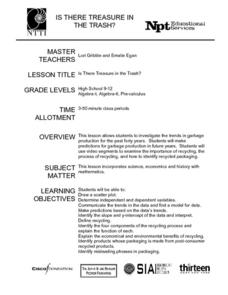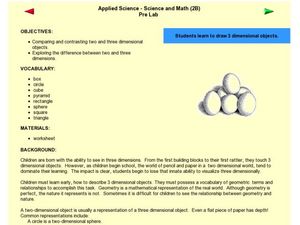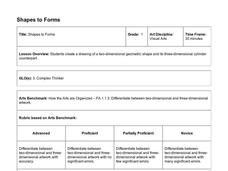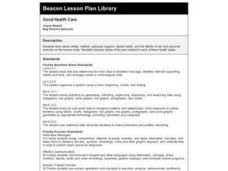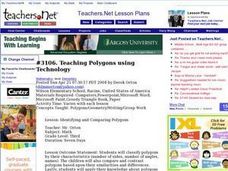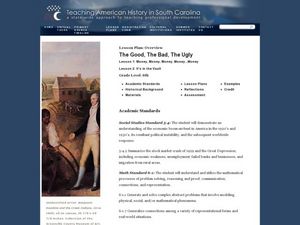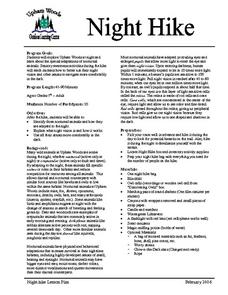Laboratory for Atmospheric and Space Physics
The Planets and Scale
Scholars gain an insight into the relative size of planets and distance between inner and outer planets with the help of informational text, a data table, and a series of four questions.
Museum of Tolerance
Why is This True?
Are wages based on race? On gender? Class members research wages for workers according to race and gender, create graphs and charts of their data, and compute differences by percentages. They then share their findings with adults and...
Curated OER
Changing Faces: A Study of Solar and Planetary Rotation Rates
Middle schoolers determine rotation rates of a variety of solar system objects using images and the Internet.
Curated OER
Building Bridges
Students identify the different types of bridges. Using the internet, they research information on how they are built by completing a scavenger hunt. Locating a specific area, they determine which type of bridge would be appropriate and...
Curated OER
Is there Treasure in Trash?
More people, more garbage! Young environmentalists graph population growth against the amount of garbage generated per year and find a linear model that best fits the data. This is an older resource that could benefit from more recent...
Curated OER
Climatic Zones
Third graders recognize and locate Frigid, Temperate, and Torrid climatic zones on the word map or globe. They explain that plants, animals, and human societies display adaptations to the climates they live in .
Curated OER
Draw 3 Dimensional Objects
Bring three-dimensional shapes to life in your classroom. First introduce the vocabulary of three-dimensional shapes, such as sphere, cube, and pyramid. Then, show your kids examples of how to use two-dimensional objects draw...
Curated OER
Shapes to Forms
Here is a math lesson that is really a visual arts lesson in disguise! In it, pupils utilize their knowledge of geometric shapes and forms to create a detailed version of a cylinder. The instructions on how to go about the task are very...
Curated OER
Newtonian Mechanics
Students familiarize themselves, through teacher demonstration, with Gavendish's apparatus first used for experimentally determining the value of the Universal Gravitational Constant G, and calculate theoretical value of Earth's...
Curated OER
Property Lists for Quadrilaterals
Young scholars establish classifications of shapes by various properties (angles, sides, etc.). They introduce the important properties of common shapes. Students develop an awareness of the wide variety of ways the 2-D shapes can be alike.
Curated OER
FLIGHT FAIR
Young scholars conduct their personal investigations into paper airplane flight. Cooperative teams are formed, with students choosing the paper airplane design that they are most interested in building.
Curated OER
Exploring the Orthocenter of a Triangle
Young mathematicians explore the concept of triangles as they construct altitudes of triangles to find the orthocenter. Learners construct their triangles using Cabri Jr. on their graphing calculators and find that the altitudes of a...
Curated OER
Introduction to Conic Sections
Learners slice cones and identify the different conics formed. They then derive the formula to solve problems involving cones. Pull out the TI calculators to visualize the slicing and the different parts and properties created.
Curated OER
Good Health Care
Students work in collaborative groups researching topics such as nutrition, the benefits of exercise on the body, dental and personal hygiene. They conduct interviews, create charts and posters, and report their results with a written...
Curated OER
Geometry Center Games
First graders explore eight geometry activities that improve understanding of positional words and shapes. They identify, describe, and create simple geometric figures. They help another student who may not understand the concept yet.
Curated OER
Box-and-Whisker Plots
Eighth graders measure in feet and inches and convert to explore the relationship between the converted measurements. In this measurement lesson plan, 8th graders use the whisker and box plot to represent the measurement of a cat. ...
Curated OER
Teaching Polygons using Technology
Third graders utilize different types of computer programs, such as Microsoft paint and Microsoft Word to study and create different types of polygons. They use PowerPoint to create a story about a shape and others that it meets during a...
Curated OER
Geoboard Squares
Students create squares of different sizes on a geoboard. They find and describe a pattern. Students use the pattern to determine the number of squares possible on a 10-by-10 geoboard. They create squares with a horizontal base (and...
Curated OER
Making Sense Of A Round World On A Flat Surface
Students engage in a lesson that is concerned with the development of geography skills. They take part in a number of activities that center around finding and traveling to different locations. The lesson has resource links that can be...
Curated OER
Fractions and Panes
Students recognize the fractional values of window panes as part of the whole window. In this window panes lesson plan, students listen to a story about window panes and sing a song. Students look at pictures of windows and write...
Curated OER
The Good, The Bad, The Ugly
Sixth graders examine the causes of the stock market crash of 1929. In this integrated math/history unit on the stock market, 6th graders study, research, and read stocks, visit a local bank, and create a PowerPoint to show the finished...
Curated OER
Elements of Art
Third graders discover elements in visual art. In this visual art lesson, 3rd graders explore the use of line, shape, and color in visual art. After reviewing works of art, students create unique art pieces. Technology resources provided.
Curated OER
Night Hike
Students explore Upham Woods at night and investigate about the special adaptations of nocturnal animals. They identify three nocturnal animals and how they are adapted to the night. Students explain what night vision is and how it works.
Curated OER
Relating Division and Subtraction
Third graders relate the process of division to subtracting equal groups. Through guided practice and teacher demonstration, they complete division problems using a subtraction method. Students complete problems independently for...






